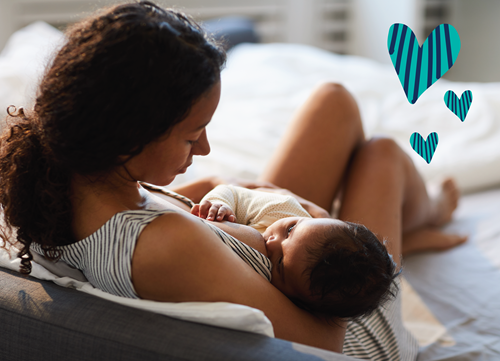From six weeks after giving birth and onwards: the checkups, your wellbeing and what you should never forget to mention to your doctor
At your six week postnatal check-up, you will have the opportunity to chat through any concerns you have about your post-baby body with your doctor or nurse, including your emotional and physical wellbeing. This appointment is also a great opportunity to introduce your baby to your doctor and make sure that everything is well with your little one.
Your doctor will want to ensure your body is recovering as it should be from pregnancy and after giving birth. Depending on the type of labour you experienced this could cover the following:
If you’re worried about how your vagina is healing after birth, or if your C-section wound is fine – these are legitimate medical concerns and should be seen to by your doctor. Don't ever feel like you need to suffer in silence or be ashamed. Be it bladder weakness, discharge or a lot of postpartum bleeding, your doctor or nurse would have heard about it a hundred times before!
This appointment is also a great opportunity for your healthcare professional to check in with how you are doing. After all, a healthy baby may be your priority, but your postpartum mental health and physical wellbeing are just as important. Take this moment to discuss how you are feeling after the birth of your baby, even if these feelings aren’t what you might have expected. This period has been described as 'matrescence', which means when you transition to motherhood, and it's a time that can be an emotional roller coaster, even if you focused on postpartum planning.
Being overwhelmed, exhausted, and maybe even a little disappointed with how your birth plan turned out are completely normal emotions that many new mothers experience. Don’t be afraid to voice your concerns – even if you think they might be minor or not worth mentioning. Nothing is insignificant when it comes to postpartum emotional and physical health: you are all your baby needs at this point, but you also need to feel supported, both emotionally and physically, during this journey with your little one.
Don’t be afraid to mention if you’ve been feeling down, anxious or tearful, or suspect you might have a touch of the baby blues. Bonding with your newborn can be overwhelming.
Perinatal Mental Health (PMH) – During and After Pregnancy
Your baby’s six-week check is a good time for your doctor or clinic nurses to meet your new arrival and check on their development. The doctor will check that they’re growing correctly and that their organs are developing as they should be.
Let your doctor know if you have any concerns about your little one and feel comfortable to ask any questions you like about your baby’s development, as well as your own recovery.
And remember, the six-week postnatal check isn't a deadline either. You’re not expected to feel completely normal again within this time frame but it’s a great opportunity to ask questions and find out how both you and your baby are doing
Wondering when your menstrual cycle will return to normal after pregnancy? Read on.
It’s hard to predict when your periods will start again as it takes a while for your hormones to settle down. It might return after a month of giving birth, or not for another year. Both are normal.
For bottle-feeding mums, or mums that combine bottle-feeding with breastfeeding, menstruation often starts five to six weeks after you swap/start to bottle-feed.
If you continue breastfeeding, your period might not restart until you stop nursing altogether because breastfeeding is known to interrupt the ovulation process (and your period, in the process).
When your period does arrive, don't be surprised to find they are much heavier or irregular for a while, during this time you might want to use a combination of maternity pads and tampons until you’re sure of which products are best for your flow.
Please don’t rely on breastfeeding for contraception. If you're worried about your period after giving birth, speak to your doctor and be aware that even if you're not menstruating there's still a chance you might get pregnant if you're not using contraception.
As the wound found at the uterine wall may not have healed yet and your muscles are much weaker, tampons are not recommended for a little while until you’ve had your six-week postpartum check-up. Your doctor or nurse will advise you on when you can begin using tampons again.
At six weeks, your doctor will check your physical wellbeing and will be able to tell you whether or not it’s okay for you to have sexual intercourse. This depends on how well you’re healing, the kind of labour and birth you experienced, and if there were any complications or interventions during birth.
Maybe you’ve already had sex. Maybe you’re dreading it. Some moms don’t feel ready to start having sex again after birth, even if their healthcare professional tells them it’s perfectly fine.
If you had a difficult or traumatic birth, sex might be the last thing on your mind. It can also be difficult to shift out of your ‘mom mindset’ and feel like yourself again, especially if you’re leaking breast milk and your menstrual cycle hasn’t returned to normal.
Take it easy, at your own pace, and remember that everybody is different. Be honest with your partner and don’t be afraid to communicate any concerns you have about sex to your nurse or midwife.

Join our community at Lil-Lets talk, the place to go if you’ve got questions on pregnancy, periods or absolutely anything else!
Lil-Lets Talk